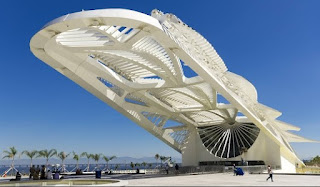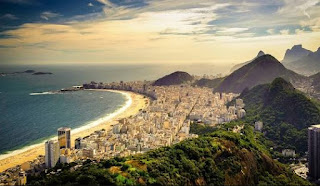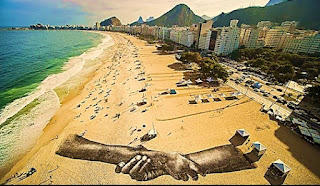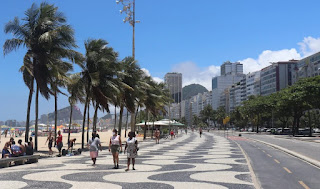Rio de Janeiro, Brazil
Overview :-
Rio de Janeiro is a vibrant and iconic city located on the southeastern coast of Brazil. Known for its stunning natural landscapes, lively culture, and annual Carnival celebration, Rio de Janeiro is a popular tourist destination and one of the most recognizable cities in the world.
Attractions :-
Christ the Redeemer : Perched atop the Corcovado mountain, this iconic statue is one of the New Seven Wonders of the World. It offers breathtaking panoramic views of the city and the surrounding bay.
Sugarloaf Mountain (Pão de Açúcar) : A granite peak rising 396 meters above the harbor, Sugarloaf Mountain provides spectacular views of the city and is accessible by a cable car.
Copacabana Beach : Famous worldwide, Copacabana Beach is known for its golden sands, lively atmosphere, and the iconic Copacabana Palace hotel. It's a popular spot for sunbathing, beach sports, and socializing.
Ipanema Beach : Another famous beach, Ipanema is known for its trendy atmosphere, diverse crowd, and the iconic "Girl from Ipanema" song. The beach is divided into different postos (lifeguard stations), each with its unique vibe.
Tijuca National Park : One of the largest urban rainforests in the world, Tijuca National Park offers hiking trails, waterfalls, and diverse wildlife. It's a great escape from the urban hustle and bustle.
Selarón Steps (Escadaria Selarón) : A colorful mosaic staircase created by artist Jorge Selarón, connecting the neighborhoods of Santa Teresa and Montserrat. It's a unique and artistic spot.
 |
| Copacabana Beach |
Facts :
Carnival : Rio de Janeiro hosts one of the world's most famous Carnival celebrations. The city comes alive with samba music, vibrant costumes, and lively parades, attracting millions of visitors each year.
Guanabara Bay : The city is situated around the beautiful Guanabara Bay, surrounded by lush mountains and tropical vegetation.
Maracanã Stadium : One of the largest football (soccer) stadiums globally, Maracanã has hosted two FIFA World Cup Finals (1950 and 2014) and is a historic venue for the sport.
History :-
Portuguese Colonization : Rio de Janeiro was founded by the Portuguese in 1565 and served as the capital of Brazil for nearly 200 years until Brasília took over in 1960.
Imperial Capita l : It became the capital of the Empire of Brazil in 1763, and later the capital of the Republic of Brazil until 1960.
Modern Era : In recent years, Rio de Janeiro has faced challenges related to urban development, crime, and social inequality, but efforts have been made to address these issues and improve the quality of life for its residents.
About :-
Rio de Janeiro is a city that blends natural beauty with cultural richness. Its residents, known as "Cariocas," are known for their warm hospitality and love for music, dance, and celebration. Whether you're exploring the historic neighborhoods, enjoying the beaches, or immersing yourself in the lively street life, Rio de Janeiro offers a unique and unforgettable experience.
How to Reach :-
By Air :-
Galeão International Airport (Aeroporto Internacional Tom Jobim - GIG) :
- Also known as Rio de Janeiro International Airport, Galeão is the main international airport serving the city.
- It is located about 20 km (12 miles) north of the city center.
- Many international airlines operate direct flights to Galeão from major cities around the world.
Santos Dumont Airport (Aeroporto Santos Dumont - SDU) :
- This airport is closer to the city center, situated about 2 km (1.2 miles) from downtown Rio.
- It primarily handles domestic flights but does have some international connections, especially to other South American destinations.
By Land :-
Bus :
- Long-distance buses connect Rio de Janeiro with various cities and regions within Brazil.
- The main bus terminal is the Novo Rio Rodoviária, located in the northern part of the city.
Car :
- If you are traveling from nearby cities or regions, you can reach Rio de Janeiro by car via well-maintained highways.
By Sea :-
Cruise:
- Rio de Janeiro is a popular port of call for cruise ships, especially during the South American cruise season.
Visa Requirements :
- Before planning your trip, check the visa requirements for your nationality. Brazil requires visas for citizens of certain countries. Ensure that you have the necessary documentation in place.
Local Transportation :
- Once in Rio, the city has an extensive public transportation system, including buses and the metro, making it easy to navigate within the city.
- Taxis and ride-sharing services are also widely available for convenient and flexible transportation.
Tips :
Currency : The local currency is the Brazilian Real (BRL). It's advisable to have some local currency on hand for small purchases, as not all places may accept credit cards.
Language : Portuguese is the official language in Brazil. While English may be spoken in tourist areas, it's helpful to know some basic Portuguese phrases.
Safety : Like any major city, Rio de Janeiro has its safety considerations. Stay informed about the current safety situation and take necessary precautions, such as avoiding displaying valuable items in public.





0 Comments